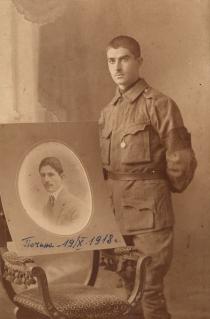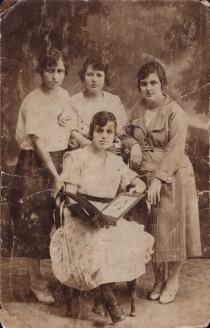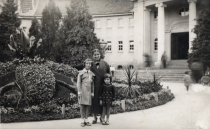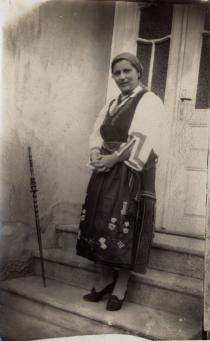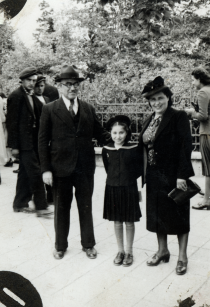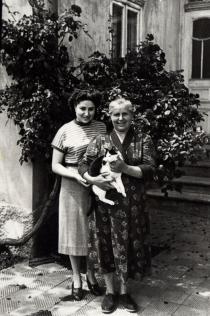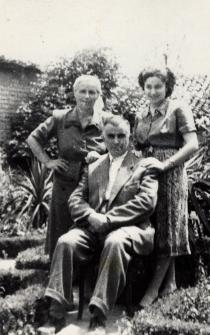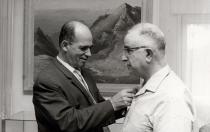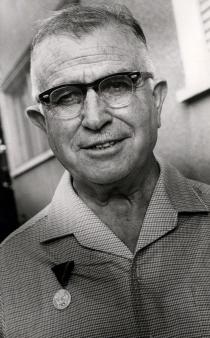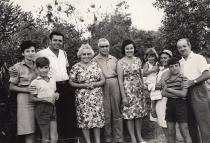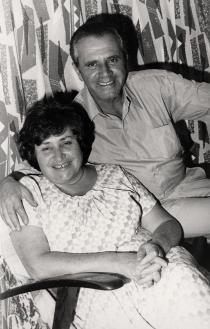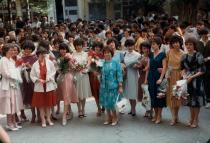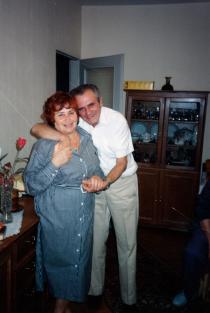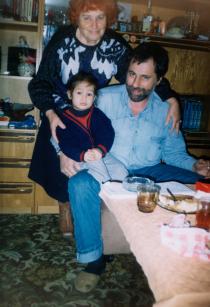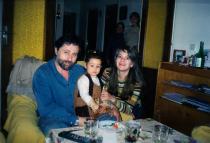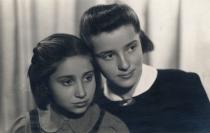
Klara Kohen
Sofia
Bulgaria
Interviewer: Stephan Djambazov
Date of interview: March 2003
Klara Kohen is 74 years old and quite energetic for her age. She lives in Druzhba quarter – a residential district of Sofia, far from the city center. She is very much influenced by leftist ideas, which is quite common for Jews who remained in Bulgaria after the establishment of the communist system. Since her husband passed away and her son has moved to Spain together with his wife and child, Klara Kohen has lived by herself in a two-bedroom block apartment. She inhabits only one of the rooms, as she has cut for reasons of economy the heating in the other one. She is happy that Jewish organizations help her cover her expenses. She doesn’t feel lonely as she maintains contacts not only with the Jewish community of Sofia but also with her Bulgarian neighbors in the living estate.
My family background
My ancestors came from Spain. They spoke Spanish, which had changed through the years and now is called Ladino. I know neither what they dealt with nor what their material status was. They were religious for sure, as the older generations of Jews were religious and that preserved their identity. Not until the socialist times [1944-1989] did Jewish people start mingling with Bulgarians, with Christians. Before that our ancestors had kept their national identity strictly. They came to Bulgaria in the 16th century during the Turkish rule [see Ottoman Rule in Bulgaria] 1. They were chased away from Spain and probably they had come in groups by sea and land spreading over Turkey, Bulgaria and the Balkans as a whole [also see Expulsion of the Jews from Spain] 2. I remember asking my paternal grandmother Rivka Avram Solomonova to tell me about the Turkish times but never did she say anything special about it. I think nevertheless that they had lived well both with Turks and Bulgarians.
I never met my paternal grandfather Avram Solomonov, because he died young. Most likely he did some kind of trade – peddling, because his family wasn’t rich. They spoke Ladino. I don’t have any photos and I don’t know how they dressed. But I remember some clothes my mother kept. They used to belong to her mother Buka Avram Almalech, who was from a very rich family from Svishtov. She married Avram Almalech, who was from a well-known family. My mother used to say that a whole caravan of chests and packing cases was used to transport her mother’s dowry through the Balkan Mountain. She was very rich. Her father in Svishtov dealt with wheat. He was well off and therefore my mother had this rich dowry. When she came to Stara Zagora, she used to help everyone there. Unfortunately my grandfather Avram Almalech, who was a very intelligent man, took to drinking. I’ve always felt sorry that my grandfather couldn’t give my mother the education she really deserved, as she was very intelligent, well read, musical, very talented and skilful... My grandfather became a habitual drunkard – and they say Jews don’t drink! He fell on the streets. And so he died of bronchopneumonia young, before he turned 50. He was quite different from his brother Aron.
My grandfather spoke French; he maintained contacts with France for some kind of clothes. Later, because of the drinking habit of my grandfather, my grandmother Buka fell sick – maybe of tuberculosis – and my mother Zhana Santo Avramova started taking care of her and thus couldn’t get proper education.
So, as I mentioned before, my grandmother had those clothes – some kind of a violet velvet dress embroidered with tinsel. There were also man’s overcoats – again in violet with gold-lace embroideries. My mother had those clothes from her mother, but later, before she left for Israel, I think she endowed them to the synagogue.
My grandparents lived in a house, but they didn’t own it, as my grandfather was a good-for-nothing man. They lived in a rented place. There was neither running water, nor electricity. My mother used to say that they went as far as the next street corner in order to fetch water. My mother got engaged to my father in 1923, so she probably spoke about her younger years, when she was ten or eleven years old. In Stara Zagora there was no electricity. People used coal in order to heat their stoves.
My mother didn’t tell me about a yard, but probably they had one, because all houses had yards at that time. They didn’t have any servants, as they weren’t well off. They probably visited the synagogue once a week. I don’t know if they observed the kashrut but my parents and I didn’t keep kosher. Pork was never brought to our house though. Pork wasn’t allowed in our house. When there was a shochet my mother and I went to him in order to have the hens slaughtered by him. He had a special way of killing the bird instantly. My grandfather and grandmother were most anxious about these traditions. They cherished the Jewish traditions a lot. I don’t know what my grandfather’s political convictions were.
My mother was born in 1900 in Stara Zagora and my father in 1896 in Nova Zagora. My father graduated from the commercial school in Burgas, while my mother had elementary education. My father had two brothers: the first one, Mordo, died after the war [WWI], while the second one, Solomon, is over 80 years now and lives with his son in a kibbutz in Israel. My father also had a sister named Joia, about whom I know only that she used to live in Israel. Mordo, my father’s elder brother was the most intelligent one among the siblings, who took my father to study in Burgas. My father served as a telephone operator during World War I [also see Bulgaria in World War I] 3. He knew the Morse codes. Unfortunately Mordo died early. He fought on the front and after he returned he died of the Spanish flue. My mother had one sister, Rosa Danish Mitrani, nee Almalech. I don’t know anything about her.
Bulgarian is my parents’ mother tongue, but they also knew Spanish [Ladino]. They didn’t speak Ivrit, but my father could read it. My father worked in a Jewish factory manufacturing beds and my mother was a housewife. My father’s cousin Shapat introduced them to one another. They got married in 1924 and in 1925 my sister Suzi Sami Eshkenazi, nee Solomonova, was born. My parents dressed in secular [conventional] clothes just like the Bulgarians did. My family has always been quite well off. In the very beginning, until my father got that job, their situation was rather miserable. As my mother told me, they used to feed my sister with bread and coffee when she was a little child. It seems that at that time coffee was cheap. Later my father became an accountant and was able to provide for his family.
My father took an active part in the September uprising [see Events of 1923] 4 and held the power for seven days in the village of Koniovitsa in Nova Zagora district. When the uprising was suppressed, he was taken on foot from Koniovitsa to Nova Zagora. He was beaten not only for being a communist but also because he was a Jew. My mother was engaged to him at that time. She went to the place were he was kept under arrest in order to take him with her to Stara Zagora. It was then that he broke contacts with the Communist Party because he had been severely beaten. After he returned to Stara Zagora he became an accountant in the bed factory and cut his ties with the communists. He did this because of his family. After 9th September 1944 5, when the communists took power, he enrolled in the Bulgarian Communist Party again.
My mother was a Zionist and my father wasn’t happy with that. She was a member of WIZO 6, which was involved in educational and charity activities. After 9th September 1944 the organization ceased to exist. Once every Jewish house had two sealed tin boxes – one for the Keren Kayemet Leisrael 7 organization – for money collected in order to buy land in Israel. In this box, which we used to call ‘kumbarichka’, my father never dropped coins as he considered it to be too Zionistic. He usually dropped coins in the other box – for Bikur Cholim 8, a charity for sick and poor people. A commission came from time to time in order to collect the savings from every house.
My father was quite strict. He was devoted to his family, but he was a very tough man indeed. Even if I fell down he would scold me. On the other hand he was very kind-hearted. He was educated but he couldn’t spare much time on reading unlike my mother. She was very well read and musical. She could speak about operas and operettas, and I still keep wondering – how come this woman was so well informed in her young years? It remains a mystery to me. She read a lot. I learned from her about the literature classics – the Russians like Tolstoy 9, Dostoevsky 10 as well as Western European ones ... My mother wasn’t highly educated, but she was clever.
The one-floor house we lived in was our property. I lived there with my parents and my sister. Our house had three rooms: a dining room, a living room and a bedroom. My sister and I slept in one of the rooms, and my parents inhabited the other one. And there was a drawing room kept especially for guests. There was a separate kitchen and quite a large larder, a lean-to – a summer kitchen with a fireplace, as well as a beautiful garden and a nice tiled yard. This house belonged to the owners of the factory, in which my father was employed. The owners were two brothers, Iliya and Vitalii Assa. They left for Sofia and transferred the management of the factory to my father. Upon their leaving they left the house to him and I remember that he paid for it in installments throughout his life. It was a wonderful place with very nice trellis-vines. As my father got part of the profit, as soon as he bettered his position, he separated with an associate to develop his own business. There were flowers and various fruit trees – cherries, apricots, pears, plums, and grapes. There were no vegetables.
My parents’ relations with the neighbors were wonderful. They were Bulgarians, who kept our property during the internment. Our closest neighbors were the Hadzhimihovs, to whom we left our furniture then as well as to my father’s associate Stefan Belchev. Other neighbors of ours were the teachers’ family Balkanski, who also treated us well. I cannot recall any other specific examples of this nice coexistence between Jews and Bulgarians, but I’ve heard about similar cases many times. Otherwise my parents became friends with Jews. They lived in a closed Jewish circle. Only during the socialist times did they open up to other people. Before that they lived an isolated life.
My parents kept in touch with some cousins from Stara Zagora. They met on holidays or weddings, graduation balls and other celebrations. The cousins used to drink mastika 11 with boiled eggs and salads. One of my father’s cousins was very close to us – his name was uncle Kemal and he used to drive us in a cab.
I didn’t go to kindergarten. My mother was a housewife at home and she took care of me. I didn’t have a nanny either. At home I communicated mainly with my mother. She introduced me to literature and music. She used to perform arias from operettas. At that time there was an opera house in Stara Zagora – it wasn’t a state one but a municipal one.
Growing up
I was born in 1930 in Stara Zagora. My childhood was wonderful. I studied in the Jewish school the first four years, where I also learned Ivrit. Later, in the three years before the Holocaust, when Bulgarian children had religious classes, we went to the Jewish school, which was very close in order to continue studying Ivrit. I understand a little of it even now. My sister also studied in a Jewish school, then in a high school, and as soon as she graduated from it, we were interned to Targovishte. After the four grades in the Jewish school I attended the Bulgarian junior high school. Of all school subjects I loved languages most, but since I didn’t want to study German, I studied Italian. German sounded rather harsh to me, and it even became more unpleasant to me because of the events that took place at that time. I liked the ‘music’ of Italian and Spanish. I also took private lessons in French. My mother influenced my choice to study French as her father had connections in France. She also insisted that I should learn to play the piano but my time was preoccupied with languages and I couldn’t pay attention to it, for which I felt sorry for the rest of my life. I was deeply attracted to music and I had a nice voice.
The opera in Stara Zagora, and the books of Russian and Western European classics were important parts of my childhood. I had a great childhood. Back then there were around 30,000 citizens in Stara Zagora. I don’t know about the exact number of Jews, but they weren’t few. There were horses and carts in the town, but the streets weren’t paved and became very muddy when it was raining. One of my father’s cousins had a cab and he used to give us a ride in it in order to take us to Stara Zagora spa, about 10 kilometers away. That was our greatest pleasure.
Jews lived in a community. The richer ones brought to the poorer ones hens during holidays; people used to help each other. There was a synagogue, a chazzan and a shochet, but no rabbi. Kosher meat was eaten. Lambs were also slaughtered and the internal organs were provided for the chazzan. That was before 9th September 1944; after that these rituals weren’t performed. Bar mitzvah and brit milah were celebrated. There wasn’t a separate Jewish neighborhood in Stara Zagora and the typical Jewish professions were various: there was a bank director and an accountant, there were also a lot of craftsmen such as tinsmiths, leather-workers, butchers ... My father had his own workshop for the production of beds. There was a Jew who was a car-mechanic, and there were traders. But it is not true that the Jews were rich – most of them were poor. Maybe there were around ten people who were well off; the rest were quite poor.
In my childhood there was electricity as well as running water inside the house. My mother always complained that my father didn’t spend much money on furnishing. Everything was simple in the house. We heated the rooms with coal-burning stoves. We didn’t have a bath. We always had a cat and a dog. We also had hens. There was a maid, a girl from the villages. She helped my mother with the cleaning. She used to live with us. Not for very long, maybe two or three years. My mother did the shopping in our family. We had a lot of books: the ones by the Russians I mentioned earlier and by classical Western European writers such as Ibsen and Zola. [Editors note: Ibsen, Henrik Johan (1828-1906): Norwegian poet and playwright; Zola, Emile (1840-1902): French writer and critic, leader of the naturalist school.] The books were in Bulgarian. My mother bought them, but she also read books from the library – there was a city library in Stara Zagora. There was a dentist, a Jew, from whom she also used to borrow novels. She used to send me to collect them and later I returned them. My mother also bought children’s books. We didn’t have religious books.
My parents regularly read newspapers: ‘Utro’ [Morning], ‘Zora’ [Dawn], ‘Zarya’ [Sunrise], which were the most popular newspapers at the time. My mother used to tell us how she read between the lines and realized what had happened. We had a radio set but it was confiscated after the legislation of the anti-Jewish laws [see Law for the Protection of the Nation] 12. Upon our return from the internment we got it back [see Internment of Jews in Bulgaria] 13.
I never went on vacations with friends. My father was very strict – he had what we call a ‘Turkish’ moral. Until I got married he didn’t let me be late or go out with people, let alone when I was younger. I remember that I went for a drive in a car only after I got married. My husband bought a car around 1970. Anyway, I got on a plane for the first time as early as 1955, when I traveled from Stara Zagora to Sofia to get married. And I boarded a train when I went on vacations to Burgas with my parents. We stayed there for two or three weeks and we used to go to the beach. Sometimes we had vacations at the Stara Zagora spa and in Bankya, close to Sofia. I cannot remember my family going to any restaurant in Stara Zagora. We did go to a confectioner’s shop though when we went out for a walk on the main street.
I used to read a lot in my spare time. I used to ask my mother to give me money and immediately ran to a little bookshop in order to buy books. During the holidays we used to go out for a walk, and on slides if there was snow in Stara Zagora. We often went to Aiazmoto, which was close to town. We brought the accordion with us, played and sang songs with our classmates or parents. We visited each other. Special dishes were prepared on holidays, for example agristada [boiled chicken stuffed with home-made mayonnaise].
The Jewish traditions were observed at home. We visited the synagogue only on the high holidays. Otherwise we celebrated every holiday at home. For example, we ordered mavlach, which is something like today’s red sugar cockerels for Purim. Mavlach came in all kinds of shapes: there were various patterns such as scissors. The whole table was covered with ‘mavlach’ and we used to give some of it to our neighbors too. On Easter our Bulgarian neighbors used to bring us a wonderful homemade Easter cake as well as red-painted eggs. We exchanged presents. And this probably describes best our relations with the neighbors.
My family celebrated the high holidays: Rosh Hashanah, Yom Kippur, Chanukkah and Fruitas 14. On Sabbath we used to cook something more festive. The house was cleaned, but we didn’t light candles or read anything because Bulgarian Jews are not fanatics. Besides Ivrit we didn’t study any special religious subjects at school. Only on holidays we were served special sweetmeats on the occasion of certain holidays. We were girls and we didn’t have our bat mitzvah, whereas now they do it in the synagogue. Years ago we had the bar mitzvah for our son at home and we invited some guests. I don’t have a favorite holiday. Our holidays are not connected with God. They are more linked to our history and similar from this point of view, so I don’t have a favorite one.
I remember manifestations, which Jewish organizations like Maccabi 15 took part in. They marched in their white shirts and navy blue trousers – handsome, young and shapely. The songs were about the tsar, different marches, some of which are still popular today. It’s a shame that at that time there were no suitable sports organizations for me. They simply didn’t exist then. There were no tennis clubs, nor any other kind of ‘modern’ sports organizations. I used to go bowling and played chess, but there were no organized sports events like there are now, say, in swimming or tennis etc. I was more energetic than my sister. I loved climbing trees. I used to play in the neighborhood until the other children started avoiding me.
I didn’t have many Jewish classmates. Most of them were Bulgarians. Outside school we stuck to our Jewish circle [especially] when the anti-Jewish persecutions began. I was a schoolgirl then. The Bulgarian children started avoiding us at that time. I made friends with Jews then. I remember, although I was a little girl, that the Jews were afraid of Hitler. My parents used to discuss the persecution of Jews and the war [WWII]. I remember how my father was happy that the Soviet Army took Kharkhov back. My father used to say that Bai Ivan would save us. [Editor’s note: ‘Bai Ivan’, meaning Uncle Ivan, is a popular expression for Russia and the Russians in Bulgaria.]
When I was a child I didn’t feel any anti-Semitism. When I was a little girl, some four or five years old, I remember playing with all children outside. When I turned ten and the Law for the Protection of the Nation was passed the children started chasing me away! Not the adults, but the children who listened to the anti-Jewish propaganda. I wondered why it happened so. I wanted to go to a vacation camp and was rejected with the explanation that Jews weren’t allowed there. Yet our neighbors, elderly people, helped us a lot... As we weren’t allowed to take furniture with us during the internment, we gave our household belongings to the neighbors in order for them to keep them for us. And when we came back from the internment they did return everything to us the way we had left it to them! When Jews were forbidden to own companies, my father passed the workshop he had to his business associate – a Bulgarian, who returned it to my father when we came back from the internment. So, from parents’ point of view there was no anti-Semitism at all. Actually that happened with the children mostly because of the Branniks 16. They were given clothes, taken to camps and incited against the Jews and the communists.
I didn’t hate any of the teachers, nor did I particularly like them that much. I remember my private teacher in French. The lessons in accordion were also private ones. Once my father even went to Stara Zagora after we had already been interned to Targovishte, and he brought it from there and I continued taking private lessons. We could afford it because we had financial stability in Targovishte, as my father’s associate kept sending him money during the internment. I was never a victim of anti-Semitic demonstrations on my teachers’ or classmates’ side. Yet there was a teacher in gymnastics who disappeared right after 1944. His name was Kirev. His wife, Mrs. Kireva, was a maths teacher. He constantly wore a Brannik uniform. He had crooked legs and tortured us by examining a girl, whose father was an outlaw, and I all the time. Immediately after 9th September [1944] this man sort of vanished. When they say now that some people were killed without charge or trial, I think that’s what happened with Kirev, too. Who knows, maybe they [the new authorities] harbored a grudge on him, as he used to be the chief of the Branniks in Stara Zagora. He simply disappeared. His wife used to ask me, ‘Klara, how are you?’ whenever she saw me after 9th September [1944]. I couldn’t even look her in the eye! But apart from this I cannot recall any bad attitude towards Jews on my neighbors’ or teachers’ side.
During the War
It was hard for us when we were forced to wear yellow stars and so was the internment, as we had to give up our household. We were allowed to take some suitcases but we managed to share out our belongings among our neighbors. My father’s associate took some belongings. [According to the anti-Jewish legislation the Jews had to liquidate their household belongings, i.e. they were not allowed to own very much.] We were allowed to sell our household belongings but we didn’t want to. I know that in Sofia lots of Jews did sell everything placing it in front of their houses, and they sold it dirt-cheap. Anyway, so we were able to preserve our belongings, because after the end of the internment we got everything back from all the people we had given it to.
Our internment lasted from June 1943 till September 1944. Many of the other Jews lived in misery. They ate from a common cauldron; they slept in schools. We rented a lodging of our own in a Bulgarian quarter, and after that we moved to another one in a quarter, which had more Jewish inhabitants. There my father even used to gather with other Jews pretending they played cards, but actually they discussed the international situation, politics and the threat to Jews. My father financially supported his compatriots. He had this opportunity because his associate in Stara Zagora sent us money on a regular basis.
In Stara Zagora the grown-ups treated us well. Only few young men showed a hostile attitude: they shouted and whistled at us. In our first lodging in Targovishte well off Bulgarians lived opposite us. One day an elderly woman from that house, hidden behind high walls, called my mother and told her about the concentration camps where Jews were burned to death and turned into soap. We weren’t aware of that then, while she had learned it from her sons, who were lawyers.
There was a military unit in town. There were rumors that sometimes soldiers or sergeants caught Jewish boys and forced them to march all night long on the drill ground of the barracks and do exercises. Two very beautiful Jewish girls were raped and our parents were very concerned about my sister, who was 15 at that time, and also about me.
Otherwise there weren’t larger repressions against the Jews; we could walk freely in the town unlike in other places, where Jews were only allowed to walk freely for two hours or so. My husband Ezra has told me that the situation was like that in Pazardzhik. I cannot say exactly what it was like, as I didn’t witness it, I’ve heard it only from Ezra. There was a curfew in the evening. I cannot remember exactly at what time. [Editor’s note: The curfew was in theory from 9am till 9pm but often neither the authorities nor the internees kept it.] I recall an interesting incident: the military town-major lived next to us. He used to send for me in order to play with his child, because the other neighboring kids were rather simple-minded in his opinion.
The German soldiers didn’t behave haughtily or contemptuously, nor did they repress the Jews. They were very clean unlike the Bulgarians and I wouldn’t be surprised if they didn’t know exactly what was happening to the Jews in their country. They were victims of that war as well. I remember another incident from Stara Zagora: We had a sign on the front door that our house was Jewish. So, German soldiers came in, sang and played. There was a pump next to the front door and they usually began bathing. My mother told them, ‘This is a Jewish house’. ‘Nein, nein, nein’, they replied and continued bathing. It didn’t matter to them. They became tired and we had a nice bench from the factory and they would lay down on it and fell asleep. My mother told them, ‘This is a Jewish house’. ‘Nein, nein’ – they just ignored her. So strange! It occurs that Hitler did harm not only to the Jewish nation or to the Slavs. He put his own people in a terrible situation as well. The Germans didn’t treat us, Jews, badly. I don’t know, perhaps it was different with the SS. But the ordinary soldiers weren’t like that; they entered the house in order to wash themselves, lay down and get some sleep because they were exhausted. It was a hard war not only for us; it was terrible for everyone.
My father wasn’t sent to labor camps because of his advanced age [see forced labor camps in Bulgaria] 17. When we returned to Stara Zagora in the fall of 1944 after our internment to Targovishte, our entire household was intact. A doctor’s family was accommodated in our house, which was a nice house close to the center of Stara Zagora. The doctor used to work in the hospital ascertaining causes of death. They were Bulgarians but they weren’t pleased that they had to leave the house. The doctor had even expressed the opinion that it wasn’t very clear how the war would end and that he hoped for the V2 rockets – [Hitler’s] ‘secret weapon’. So, they didn’t want to leave the house at all, but they did anyway. Later it was commented that the death diagnoses he gave, especially to the communists before 9th September 1944, were not very correct. So, he counted on V2. Unlike him the other neighbors were very warm-hearted. The number of presents they piled up for us when my parents’ left for Israel is hard to imagine! Our house was also well preserved.
After the War
After our return my father took up his work again as well as the management of the company. I had to continue my high-school studies and my sister got married. She came to Sofia in order to study at university. She enrolled in the Institute of Economics, but she got married in 1945 and quit her studies. Then she gave birth to her daughter Franklina in 1947, and after that she moved to Israel in 1950, where she gave birth to her second child, Menahem in 1957. I studied in the high school in Stara Zagora until 1947, and then I applied and began studying French philology in Sofia. My parents stayed in Stara Zagora.
After the end of my studies in 1951 my parents and especially my mother insisted on leaving for Israel in order to get together with my sister, who had already moved there before. I already had a relationship with my future husband and although I had an international passport, I decided to stay. I got married and stayed, while my parents left. I stayed because of my husband, as his brothers were also here. One of them was a pharmacist, the other one was a doctor and they didn’t want to leave Bulgaria. And so I stayed and my family and I got separated. I married a month before my parents left. They had already sold the house. I tried to persuade them to stay, but my father said, ‘It’s over, we are leaving, it’s already decided and it’s final.’ He said that although he didn’t really want to leave. Anyway, finally they left because my mother wanted to get together with my sister. This happened in 1955 when the immigration wave [see mass aliyah] 18 had already blown over.
My husband Ezra Samuil Kohen and I met in Sofia – we were both students at Sofia University. Ezra studied chemistry and later he started working in Himkombinat [Chemical plant] in Dimitrovgrad. He had a first cousin in Stara Zagora. His first cousin brought him to Stara Zagora in order to introduce us to one another and it occurred that we actually knew each other already. Thus our relationship began. We went for walks and chatted. We were fiancés for two or three years before we got married – he used to come to Stara Zagora in order to meet his cousin and me. We used to write to each other.
My parents didn’t oppose to our wedding. The reason was that before that I had had a love affair with a young Jewish man, who graduated in medicine. He insisted on leaving for Israel because the graduates were immediately distributed to work [in Bulgaria]. I would have needed to marry him and leave with him. At that time my mother wrote a letter, which read: ‘My heart would start bleeding if you also move there just like your sister did...’ And then that boy and I split up because of my mother. The second time I decided to get married she didn’t interfere. She and my father decided that since they had already stopped me once, they wouldn’t tell me what to do again. And so she didn’t withhold me from doing it. My mother had a really strong desire to move to Israel and be with her children there. To the very last moment she thought that I would also leave. She didn’t expect me to say ‘no’. Finally my parents left for Israel as my mother’s desire to leave and join my sister and her family there got the upper hand of it. The fact that many of their friends had already left was also of importance.
I’ve never been a member of a political party. I’ve been a member of youth organizations, but I’ve never been an activist. My husband was a member of the Bulgarian Communist Party. He was born in 1929 and became a member at the age of around 25. Lots of friends left for Israel at that time. Stara Zagora became a ghost town. I was also about to leave for three times: first with the youth organization; I don’t know why it didn’t happen in the end. The second time I wanted to leave with my sister and my brother-in-law, but it came to nothing; and the third time I was about to depart with my mother and my father, but again, it didn’t happen. Somehow I wasn’t destined to move to Israel.
When I finished university I returned to Stara Zagora and became a teacher. I didn’t have any conflicts at my working place because of my Jewish origin. It was the time when I became friends with people outside the Jewish community because all of my [Jewish] friends had already left. Yet I had a very nice company of Bulgarians – intelligent people, engineers. We gathered in order to listen to classical music. I will never forget how much I liked the ‘Tannhauser’ overture [from the opera by German composer Richard Wagner]. We gathered in each other’s houses so as to listen to records. Now I am thinking why the young people are so devoted to drinking and sex? We were around 20 people sharing our time only to listen to music. We also went to the opera and theater.
My husband became an orphan at the age of three. His mother, who was very poor, went about the houses as a tailor. My husband had a very poor childhood. Yet he was extremely intelligent and well read. Now I cannot tidy up his room; there are tons of books there – not only fiction, but also his specialized literature. He had lived with a poor and not very well educated mother, but he was very ambitious. He passed a post-graduate course here, in Bulgaria, after his graduation in the former Soviet Union. It wasn’t good for him that upon taking his doctor’s degree at 60 [this was after 10th November 1989 when the democratic changes started in Bulgaria] he was retired in no time because he was a communist. It was a huge blow for him! He initiated legal proceedings against the Institute of Hygiene, where he used to work before that. He was finally reinstated in his former office, but it seems that he jeopardized his own health by doing so, as two years ago he was diagnosed with stomach cancer. After the operation it occurred that he had metastases, moreover he had diabetes and two heart attacks. Finally he died of a heart attack. But all that came as a result of his retirement and the fact that he couldn’t live through it.
My son Samuil Ezra Kohen is against communists. When democracy was established in Bulgaria my son went to Israel for two years [1990–1992]. After that he returned to Bulgaria and finally he left for Spain. A friend of his had settled there and invited him. So my son went to Spain as a tourist together with his then girlfriend and later wife Valya and they remained there. Now he is already a Spanish citizen and lives there with his wife and child. The child, Klara-Flor, born in 2001, is adopted, as his wife should not give birth because of an illness. They brought the child to Spain from Bulgaria later. My son is an engineer in thermonuclear power engineering. He is aware of the Jewish traditions – he is circumcised, he had a brit. At home we used to cook dishes typical for the Jewish holiday – agristada, burmoelos 19, etc. I tried to cook richer dinners whenever I could; the Jewish holidays weren’t days off at that time. My son is familiar with these traditions; moreover he spent two years in Israel, where they are deeply respected. Now he is a member of the Jewish community in Madrid and attends all meetings and holidays.
Now I live alone in Sofia but I have many friends, including Bulgarians. Dr. Raikovska lives right below me. Last year I broke my hand – or actually, it would be more precise to say that they [the thieves] broke my hand. They pulled my bag in order to steal four levs from me [two USD]. Dr. Raikovska and I were walking via the lawn near our living estate to a shop. I was pushed and my hand was broken. She took care of me; we are like sisters. I have another friend, Margarita, a former colleague of mine, and I have another friend, who is Jewish and her name is Prof. Marieta Haimova. We communicate well. I rarely go to the synagogue, but I did go there for the anniversary of my husband [in the Ashkenazi tradition Yahrzeit], as many friends and acquaintances gathered. Otherwise I am not that regular. I keep in touch with my husband’s sister Diana.
After the Holocaust my life went on well – both in terms of education and work. And I have always told my son and his friends, who didn’t support socialism and communism: ‘And yet, in socialist times no one has ever offended my son because of his Jewish origin and he received good education.’ Fascism didn’t exist then. There was a dictatorship, yes. I could feel it at the school where I used to teach. If you would say something against the authorities it was instantly reported to the regional committee of the [Communist] Party. For example, we had such a colleague, who would slander us all the time. Yet at that time people could raise their children and were able to build or save something. My husband used to live in extreme poverty – yet he could educate himself and rise in his profession. We paid off two apartments without ever receiving any heritage from anyone. How come? We never lived in poverty, while nowadays people couldn’t possibly achieve what we once did. We live in great misery today.
The breaking off of diplomatic relations with Israel didn’t affect us practically and politically, but we suffered a lot because of the war. I remember especially 1967. My husband was in the Soviet Union then. I was alone and I used to wake up at 4 or 5am in order to turn on the radio and listen to the news. The Arabs wanted to drown in the sea all the Jews. We suffered a lot. Now I continue to follow the events. I regularly speak on the phone with my sister, who lives in Jaffa. She is desperate. As a rule Jews love life, but my sister is not like the others. I remember during the internment in Targovishte, although the people from the Jewish community knew what was about to happen to them, they gathered to play cards. They didn’t give up their little pleasures. Then my mother spent her time at home only, reading, moaning and groaning about the forthcoming events... Now my sister is just the same. She is 78 years old. When she calls she always says, ‘we are here for 50 years already and there is no improvement; the conflict won’t ever be solved. And I reply, ‘But there are talks with the Palestinians now.’ And her reply is: ‘Nothing will ever change for the better.’ Her older grandson is in the army and the young people are great idealists. The ones born there are big patriots. One would die in order to help his country. But she suffers. It kind of puzzles me: when Jews come here they immediately go to casinos and clubs. And the people there are ready to die – yet they do love life!
I was in Israel in 1961, 1977 and 1989 – before the changes here. I speak with my relatives on the phone, we write letters and send postcards. No one has ever troubled our correspondence. My husband retired after the democratization of the country in 1989 [see 10th November 1989] 20 and that wasn’t good. It’s convenient that now people can freely travel abroad but as a whole I think that people are not very happy. After 1989 I went to Madrid and so did my husband but then one had to be issued a visa from the Spanish embassy. Now perhaps I will visit my son again. Otherwise, concerning the political events after 1989, I wasn’t very impressed by the fact that Mikhail Gorbachev 21 gave up the socialist bloc very quickly. Maybe there were bad things also but why did the whole bloc have to be destroyed? Anyway, my life after 1989 didn’t change all that much as I was a pensioner, and so was my husband.
I think many things are done for Jews now. And everything is very well organized. A lot of things are done both for the youth and the grown-ups. There are groups and clubs; there is a very good organization at the Bet Am 22. We also receive financial aid – they give me 20 levs for the central heating. As I plugged in the radiators in the other rooms, this month the expenses were 40 levs – it is a tangible help; it’s half of the heating bill. Or they give me 20 levs in addition to my pension, which is not a big one: together with my husband’s it is 130 levs all in all. This money comes from Swiss banks and is distributed in the eastern [European] countries.
Last year I had a cataract operation and they gave me a lot of money. I was in a private hospital and I was operated under a brand new method, which cost around 1000 levs, and they gave me 800 levs. This year the aid was less and they said that there would be less financial support for treatment. Otherwise they provide funds both for elderly people’s medications as well as for furnishing. The money comes from Switzerland, from accounts of Jews killed in World War II.
On Saturday there are lectures organized for the ‘Golden Age’ club as well as meetings with famous people like actors, and then I go. Half of the marriages now are mixed ones. Even in cases of mixed marriages people receive additional support. So we are not ‘enclosed in capsules’ only among Jews.
It’s good that the Berlin Wall fell. Why should one nation be separated? Let it be one country. There shouldn’t have been a dictatorship and the Russians shouldn’t have interfered rudely in the internal affairs of the individual countries – Hungary, Czechoslovakia and so on. Yet, we abandoned socialism very quickly. My idea originates from the fact that my father’s blood was a ‘toll’ for the new order to be established – for the whole people to live well. I noticed that as a teacher.
When I studied before 9th September 1944 there were ragged and poor children. When I became a teacher there were no longer ragged, poor and patched up kids – they were all doing fine. They even used to drink lemonade without returning the bottles as a deposit. We, the teachers used to do that for them. And we couldn’t find a proper person to give him a scholarship, as at that time it was given on the basis of the parents’ income. People lived well. As I know the struggle we fought in order to establish a just system, excluding the negative things, we shouldn’t have given it up so easily… And people gave their blood for it. In socialist times there were neither poor nor hungry people. There was work to be done. Now where should they go? And this is a sad thing: that young people keep leaving Bulgaria. As a whole, capitalism is a frightening system. The state donated before but who would do this now? I don’t know but life is difficult nowadays. This is my opinion.
Glossary
1 Ottoman Rule in Bulgaria
The territory of today’s Bulgaria and most of South Eastern Europe was an integral part of the Ottoman Empire for about five hundred years, from the 14th century until 1878. During the 1877-78 Russian-Turkish War the Russians occupied the Bulgarian lands and brought about the independent Bulgarian state, which however left many Bulgarians outside its boundaries, mostly in areas still under Ottoman rule. The autonomous Ottoman province of Eastern Rumelia united with Bulgaria in 1885, and Bulgaria gained a small part of Macedonia (Pirin Macedonia) in the Balkan Wars (1912-13). However complete Bulgarian national unity was never achieved as many of the Bulgarians remained within the neighboring countries, such as in Greece (Aegean Thrace and Makedonia), Serbia (Macedonia and Eastern Serbia) and Romania (Dobrudzha).2 Expulsion of the Jews from Spain
The Sephardi population of the Balkans originates from the Jews who were expelled from the Iberian peninsula, as a result of the ‘Reconquista’ in the late 15th century (Spain 1492, and Portugal 1495). The majority of the Sephardim subsequently settled in the territory of the Ottoman Empire, mainly in maritime cities (Salonika, Istanbul, Izmir, etc.) and also in the ones situated on significant overland trading routes to Central Europe (Bitola, Skopje, and Sarajevo) and to the Danube (Edirne, Plovdiv, Sofia, and Vidin).3 Bulgaria in World War I
Bulgaria entered the war in October 1915 on the side of the Central Powers. Its main aim was the revision of the Treaty of Bucharest: the acquisition of Macedonia. Bulgaria quickly overran most of Serbian Macedonia as well as parts of Serbia; in 1916 with German backing it entered Greece (Western Thrace and the hinterlands of Salonika). After Romania surrendered to the Central Powers Bulgaria also recovered Southern Dobrudzha, which had been lost to Romania after the First Balkan War. The Bulgarian advance to Greece was halted after British, French and Serbian troops landed in Salonika, while in the north Romania joined the Allies in 1916. Conditions at the front deteriorated rapidly and political support for the war eroded. The agrarians and socialist workers intensified their antiwar campaigns, and soldier committees were formed in the army. A battle at Dobro Pole brought total retreat, and in ten days the Allies entered Bulgaria. On 29th September 1918 Bulgaria signed an armistice and withdrew from the war. The Treaty of Neuilly (November 1919) imposed by the Allies on Bulgaria, deprived the country of its World War I gains as well as its outlet to the Aegean Sea (Eastern Thrace).4 Events of 1923
By a coup d’état on 9th June 1923 the government of Alexander Stamboliiski, leader of the Bulgarian Agrarian Union, was overthrown and power was assumed by the right-leaning Alexander Tsankov. This provoked riots that were quickly suppressed. The events of 1923 culminated in an uprising initiated by the communists in September 1923, which was also suppressed.5 9th September 1944
The day of the communist takeover in Bulgaria. In September 1944 the Soviet Union unexpectedly declared war on Bulgaria. On 9th September 1944 the Fatherland Front, a broad left-wing coalition, deposed the government. Although the communists were in the minority in the Fatherland Front, they were the driving force in forming the coalition, and their position was strengthened by the presence of the Red Army in Bulgaria.6 WIZO: Women's International Zionist Organization; a hundred year old organization with humanitarian purposes aiming at supporting Jewish women all over the world in the field of education, economics, science and culture. Currently the chairwoman of WIZO in Bulgaria is Ms. Alice Levi.
